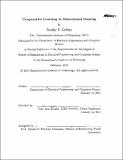| dc.contributor.advisor | Eric Klopfer. | en_US |
| dc.contributor.author | Gaffney, Bradley R | en_US |
| dc.contributor.other | Massachusetts Institute of Technology. Department of Electrical Engineering and Computer Science. | en_US |
| dc.date.accessioned | 2014-03-06T15:40:46Z | |
| dc.date.available | 2014-03-06T15:40:46Z | |
| dc.date.copyright | 2013 | en_US |
| dc.date.issued | 2013 | en_US |
| dc.identifier.uri | http://hdl.handle.net/1721.1/85420 | |
| dc.description | Thesis: M. Eng., Massachusetts Institute of Technology, Department of Electrical Engineering and Computer Science, 2013. | en_US |
| dc.description | Cataloged from PDF version of thesis. | en_US |
| dc.description | Includes bibliographical references (page 59). | en_US |
| dc.description.abstract | This thesis analyzes Herbo Hunt, an educational game that aims to teach variables to students. By assigning unknown point values to creatures that must be caught in groups, we subtly encourage students to solve mental equations to achieve their goals. In addition to the formal study, the creation of the game itself utilized intelligent and flexible design techniques. Two main focuses were modularity of design and opportunity for procedural generation of content. Two versions of the game were used to explore the difference in learning between them; we created both a single-player experience and a cooperative version. We expected that players of the cooperative game would learn more quickly through discussion and coordination. Students played both versions, and then answered short questions regarding their experience. Contrary to our expectations students did not appear to show a difference in learning between the two versions; understanding seemed to take place at the same point regardless of game type. | en_US |
| dc.description.statementofresponsibility | by Bradley R. Gaffney. | en_US |
| dc.format.extent | 59 pages | en_US |
| dc.language.iso | eng | en_US |
| dc.publisher | Massachusetts Institute of Technology | en_US |
| dc.rights | M.I.T. theses are protected by copyright. They may be viewed from this source for any purpose, but reproduction or distribution in any format is prohibited without written permission. See provided URL for inquiries about permission. | en_US |
| dc.rights.uri | http://dspace.mit.edu/handle/1721.1/7582 | en_US |
| dc.subject | Electrical Engineering and Computer Science. | en_US |
| dc.title | Cooperative learning in educational gaming | en_US |
| dc.type | Thesis | en_US |
| dc.description.degree | M. Eng. | en_US |
| dc.contributor.department | Massachusetts Institute of Technology. Department of Electrical Engineering and Computer Science | |
| dc.identifier.oclc | 870529366 | en_US |
